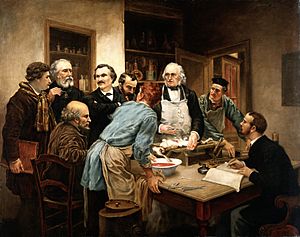Physiology facts for kids

Physiology is the study of how living things work. It explores how different parts of an organism work together. For example, physiologists study how the organs in your body, like your stomach or heart, do their jobs.
In humans, physiology helps us understand many things. It explains how your body digests food. It also shows how hormones and other chemicals are made by organs like the liver and pancreas. Even how your muscles move is a part of physiology. This happens because of chemical messages sent by nerves to the muscles.
By learning how a healthy body works, scientists and doctors can better understand what happens when something goes wrong. For instance, knowing how the thyroid gland works has helped treat conditions like goitre. Studying the circulatory system (your heart and blood vessels) and the nervous system (your brain and nerves) has helped doctors treat illnesses such as heart disease, stroke, and high blood pressure.
Contents
What is Physiology?
Physiology is a big science that looks at how living things function. It explains the physical and chemical processes that happen inside plants, animals, and humans. Think of it as understanding the "how-to" guide for life.
How Our Bodies Work
Our bodies are amazing machines. Physiology helps us understand each part. For example, it teaches us how our lungs take in air. It also explains how our blood carries oxygen to every cell. This field helps us see the bigger picture of how all systems connect.
Digestion and Energy
When you eat, your body breaks down food. This process is called digestion. Physiology explains how your stomach, intestines, and other organs work together. They turn food into energy. This energy helps you run, play, and even think!
Muscles and Movement
Have you ever wondered how you can kick a ball or wave your hand? Physiology studies how your muscles contract. It looks at the signals sent from your brain through your nerves. These signals tell your muscles when and how to move.
Hormones and Messages
Your body uses special chemical messengers called hormones. These hormones control many things. They help you grow, manage your mood, and even help you sleep. Physiology explores how organs like the thyroid gland make and use these important chemicals.
Types of Physiology
The study of physiology is usually divided into different areas. This helps scientists focus on specific types of living things.
Human Physiology
This branch focuses on how the human body works. It studies everything from how our cells function to how our organs interact. Human physiology is very important for medicine. It helps doctors understand and treat diseases.
Animal Physiology
Animal physiology looks at how different animals function. This can include anything from a tiny insect to a giant whale. Scientists study how animals breathe, eat, move, and adapt to their environments.
Plant Physiology
This area explores how plants work. It covers how plants grow, make their own food using sunlight (photosynthesis), and reproduce. Understanding plant physiology helps us grow better crops and protect plants.
Why is Physiology Important?
Physiology is crucial for understanding health and disease. When we know how a healthy body works, we can spot problems more easily.
Understanding Illnesses
Physiology helps doctors understand what goes wrong when someone gets sick. For example, if someone has heart disease, physiologists study how the heart's normal pumping action is affected. This knowledge helps create better treatments.
Developing New Treatments
By learning more about the body, physiologists help find new ways to treat diseases. Their research can lead to new medicines or therapies. This helps people live healthier and longer lives.
See also
 In Spanish: Fisiología para niños
In Spanish: Fisiología para niños
 | Sharif Bey |
 | Hale Woodruff |
 | Richmond Barthé |
 | Purvis Young |

